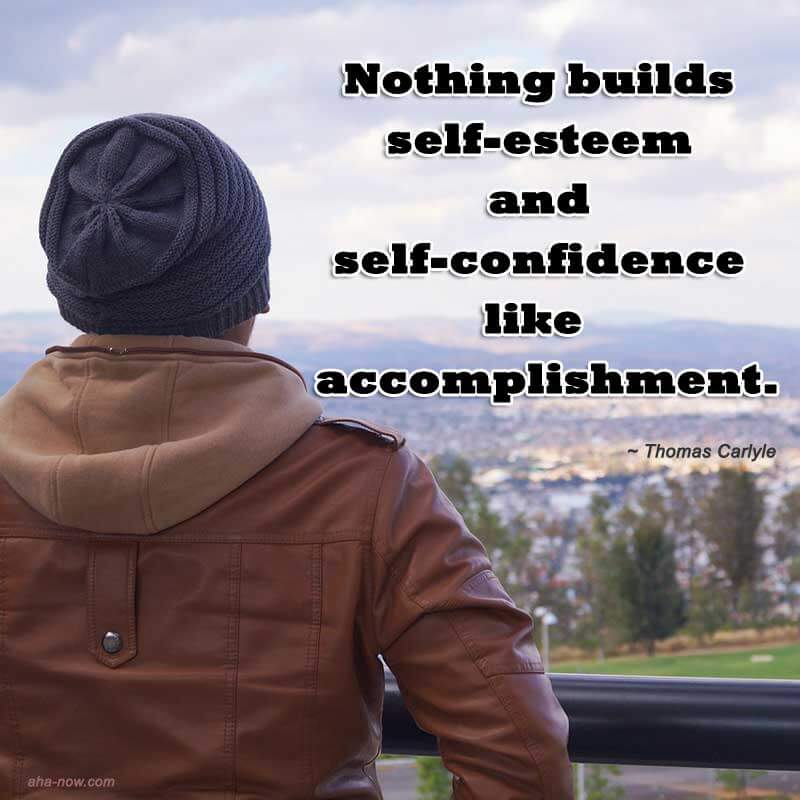4 Scientifically Proven Ways for Recovering Self-Esteem after Failure

Table of Contents
Have you ever failed miserably?
I certainly have. It’s awful isn’t it?
Failure leaves you disappointed, angry, desperate, and hopeless.
It crushes your self-esteem and convinces you that you’ll always be a failure.
You wish you could know how to get your self-esteem back.
Well, we’ve all failed at least once in our lives. Living without failing is simply impossible.
We fail if we don’t reach a goal. We fail if we don’t deliver as required or if we don’t perform as expected. And we fail if we make a mistake.
Some failures are better to hide than others, and that’s why some people seem to never fail. But deep inside, covering things up is hard, isn’t it?
Because one part of you always knows that you have failed and how you feel about it: Your brain!
You just may not realize how much your brain controls your responses to failure.
You also may not realize how much control you have over your brain —and how that can empower you.
You Control the Power to Change your Brain
As we go through life, our brains create new connections that affect our beliefs and emotions, often to the detriment of our self-esteem.
Fortunately, we have the power to change our brains to help rid our minds off the beliefs that don’t serve us.
The science behind this is called neuroplasticity, a fancy word for a simple but fascinating truth: the brain can always change throughout life.
It doesn’t just learn and create new connections; it can also break old connections.
This amazing ability of the brain and the nervous system to re-organize its structure, function and connections is researched more and more.
This knowledge is used to understand how we learn and de-learn as adults. It is also important in the medical field to help people recover after brain injuries or strokes and to understand addictions and mental diseases like depression.
This knowledge is also important if you want to change your brain.
So if you want to recover your self-esteem after failure, the following four ways will reprogram your brain to create beliefs that boost your confidence:
1. Break the connections that steal your self-esteem
It happens to all of us. We make a mistake that causes us to fail.
Now we are desperate, angry, and unbelievably sad. We then obsess over our stupid mistake —the one that kept us from reaching our goal.
This obsession causes our brains to constantly create new connections. With every new connection, our brains learn again and again that we are a failure.
With every new connection, this belief becomes stronger and stronger.
So you must not let it be engraved in your brain that you are a failure. You failed. That is part of life, and it’s perfectly ok. But you are not a failure.
There’s a big difference. Obsessing about it gives too much power to the failure, and you’re just wasting your precious time doing so.
Fortunately, you can make and also break connections in your brain.
If we take the focus from what causes the connection, we can stop new connections. If we don’t think about it for a while, the connection can be broken.
So, be disappointed and angry, stamp your foot, or shed a tear, but then shake it off. You can do that by following some practical tips:
- You can actually shake it off by physically shaking your hands. That might sound a little silly, but it works. The brain reacts to movement.
- If you lean more toward symbols, you could write your mistake on a piece of paper and then burn the paper – or tear it into many small pieces. I have done this before, and it has a wonderfully liberating effect.
- You could also make a list of all of your accomplishments and consciously focus on them. See that you are capable of so much and make your mistake look small and irrelevant.
Stop thinking about failure and your brain stops treating you as a failure.
So forgive yourself, treat yourself compassionately, and you’ll break those bad connections that wound your self-esteem.

2. Create goals that guarantee success
People often fail because they set unrealistic goals, and, also they often plan and execute wrong while trying to reach their goals.
By wanting too much too fast, we set ourselves up for failure.
By impatiently pushing towards a goal, we lose our focus on what needs to be done and fail.
In the end, all we do is program our brains to believe we are incapable of succeeding.
If this is why you’ve failed, you can recover your self-esteem by learning to set small achievable goals, give yourself more time, and plan better.
You can also track your goals and reward yourself every time you have reached one of your smaller goals.
Don’t be foolish and think only reaching a final major goal can be called success.
What we see as a big success is always the sum of many small steps and successes. So, don’t forget that every time you reach a goal you do experience success.
How to measure success – should be part of your initial planning.
And experiencing success is even more crucial and important than you might think; because your brain is again involved in this experience.
The smaller the goals, the more likely you are to succeed. And while you experience success, your brain shows high measurable brain activity.
It results in increased motivation, self-esteem, and happiness, which only increase your likelihood of succeeding again in the future. Success is what you need to go on.
Don’t expect to be a billionaire in half a year, to perform as a musician at the Sydney Opera after a few years of practice, or to lose half your body weight in a month, though.
Set yourself up for success with achievable goals.

3. Ensure you’re prepared, and try again
On your way to success after failure, don’t forget an embarrassingly simple strategy that appears to be a little bit out of fashion these days.
That strategy is to practice, practice, and practice. By practicing, we gain knowledge of how something works and the confidence with everything we do.
While you may have failed you can build your self-esteem by trying again and this time making sure you are prepared.
For important information to travel from short-term memory to long-term memory, we must repeat things at least three to five times.
Doing something only once is not enough to have it stick; unless it is mind-blowing.For the best results, repeat it as much as possible as often as possible.
Repetition tells the brain first of all that this must be important and that it is better to keep it in the long-term memory.
Repetition is also increasing the connections in the brain up to the point where a behavior or activity happens almost automatically.
Have you ever been to a conference and listened to a presentation?
Some of the presenters look totally surprised at every new slide on the screen. They lack easiness, and they have to read every slide. They are usually the people that have not practiced.
The information presented is not engraved in their long-term memory, and they look insecure.
The self-confident and entertaining presenters have practiced many times; probably with a timer next to them.
The information they present is engraved in their long-term memories and is available to them anytime. They are confident, and they represent self-esteem.
The same goes for playing an instrument, presenting results to the boss, studying for an exam, doing sports, or learning a language.
So, what you do with practicing after a failure is getting prepared to try again.
It is important to get up and not to give up after a failure. But this time try it differently by being better and more prepared.
So, get busy practicing so that you can enjoy some true self-esteem.

4. Teach your brain the truth about fear
When we fail, we often develop a lot of fear. This fear stops us from taking action and messes with our goals. It prevents us from wanting to try again. It sabotages our self-esteem.
Since fear is also important for our survival, we can’t just get rid of it.
Imagine you are standing in front of a poisonous snake. You need your instincts and all the adrenaline that fear powers into you, to run and survive.
What we don’t want is the fear that stops us, and the fear that feeds more fear and blocks our self-esteem.
Fear is complicated. Fear does not happen in one area of the brain. There exists a complex system of different brain areas all working together.
So if you’ve failed at something and then developed a lot of fears that are shattering your self-esteem, you must teach your brain that the threats it’s feeling are not real.
Here are some tips on how to manage and control your fears:
Analyze your options
It is essential to evaluate and analyze different options. Don’t think you are stuck with only one option. Look into all the options you can think of, even if they seem odd or scary.
Then rank them according to the risks they present.Finally, chose the option you want to try with confidence and consideration.
Familiarize yourself with what you fear
Regain your self-esteem by slowly getting familiar with the situation or the thing you fear. Expose yourself to a situation, observe it, and get familiar with it.
Doing so gives you control over fear, and your brain learns that no threat, but rather something familiar is present.
Talk about it
We often hide, and are embarrassed about our fear and our lost self-esteem. Sharing and speaking it out loud makes a huge difference.
This little boost of our self-esteem can reduce our fear. While we talk about it, we usually experience that a person we talk to is empathetic with us.
Surprisingly, the other one does not see us as low as we think of ourselves. This reality helps us to change our perspective and boosts our self-esteem too.
Ask for help
Maybe you are scared your work, and your abilities are not good enough. Consider getting help from an expert.
For example, a blog post that went through an editor will allow you to hit that submit button with more confidence. Or taking a few lessons before an audition will allow you to show up with earned self-esteem and reassurance.
Final Thoughts
Now we know that our brains control our responses to failure.
We also know that we have control over our brains and how we can use that to be empowered. Isn’t that amazing?
Failure is not the end of the world. What is important is to get up and go on.
For this, we need to recover our self-esteem first, so that insecurities, fears, and wrong beliefs won’t stop us again.
It is also important that we learn from our failures so that we don’t repeat previous mistakes. It is important to sit and see what went wrong.
We might do that alone or even with some help from outside.
Then we have to re-set our goals and re-evaluate our strategies. As we have learned in this post, we can do that using our precious tool of understanding our brains.
We can stop thinking about mistakes, and we can shake them off. We can set ourselves up for success and find motivation, self-esteem, and happiness.
We can practice to keep information in our long-term memories and gain confidence. Being prepared with knowledge we can get ourselves together and try again.
And finally, we can understand and control our fear to overcome it.
Over To You –
What are your experiences with regaining your self-esteem after a failure? Do you see failure and success differently after understanding your brain better? Let me know in the comments below.
Disclaimer: Though the views expressed are of the author’s own, this article has been checked for its authenticity of information and resource links provided for a better and deeper understanding of the subject matter. However, you're suggested to make your diligent research and consult subject experts to decide what is best for you. If you spot any factual errors, spelling, or grammatical mistakes in the article, please report at [email protected]. Thanks.











Hi Ilka,
Nice to see you here on Harleena’s place.
When it comes to this I think number 4 is the most difficult of all. Fear is a funny thing. We do need it in order for survival mechanisms but then there are other types of fear. Fear of the future, of failure, success…oh boy can I write a list about that!
I myself have battled it and I see it so many times in others. I did so by self talk and then Rapid Eye Movement Therapy which really did the trick. Getting deep into the subconscious mind and replacing a fear with a positive thought.
-Donna
Hi Donna!
I am happy to see you here at Harleena’s as well
Thank you so much for sharing your experience. You are absolutely right, fear is a topic that can fill pages. We have to manage it since we can’t avoid it totally.
I have read about scientific proof for the effectiveness of rapid eye movement therapy, and I am glad to hear that you have tried it with positive results. That is really fascinating.
Have a wonderful weekend, Ilka
Hey Ilka,
What a great post!
#2 jumped out at me because I have used this technique and I know how effective it is.
I love that you wrote compassionately about failure while calling it failure!
It allowed me to think of things I have not yet seen as opportunities in disguise, and has inspired me to use these techniques in new areas.
Take good care,
Jenn
Hi Jenn!
I am glad you liked the post and you found it helpful.
Good to hear that you already tried a technique and that it worked for you. I hope the other techniques will be just as effective.
Thanks so much for sharing and all the best,
Ilka
Wow Ilka awesome tips. #1 can be a reality check because all connections can rob our self esteem. Why? Any time we rely on anything or person outside of ourselves to change or define our feelings, we are doomed. You are whole and complete as is, so remember this anytime you depend on another for self esteem boosts. Thanks so much for sharing Ilka.
Ryan
Hi Ryan!
I am glad you liked the post and you found it helpful as well. Thank you for sharing your experience. Sometimes people do let us down and disappoint us. Then it is good to be independent and in control. At other times we might need help from others but should chose the help very careful.
I wish you the very best, Ilka
Ilka, what a great post. Comprehensive and full of great strategies to get life back on track. Failure is only a sign of coming success. I appreciate your post and Harleena’s consistently good features and posts.
Hi Skip!
Thank you so much for sharing. I like how you phrased that failure is only a sign of coming succes.
I am glad you liked the post. Best, Ilka
Welcome to the blog Skip – good to have you over! 🙂
So glad you liked Ilka’s post. You are absolutely right about failure being a sign of success – in fact, it’s a stepping stone towards success. I don’t think anyone succeeds without failing!
Thanks for stopping by, we do appreciate it. 🙂
Hi, Ilka and Harleena,
What a wonderful post! I really appreciate you sharing these thoughts. I love the second point about creating goals that are achievable.
I find that if I can get that ‘easy win’ it’s a huge encouragement, and build momentum for the next win, and the next. That’s my favorite takeaway!
Also, I think it’s important to properly celebrate what we have accomplished, as so many of us look at the glass half empty and focus on what we haven’t been able to do…
Hope you all are having a great weekend so far, I am.
Take Care,
Carol Amato
Hi Carol!
I am glad you liked the post. Thank you for sharing your thoughts. I like your positive approach on celebrating the glass being half full. Setting small goals and then reaching and celebrating them; I can feel motivation, self-esteem and happiness blooming.
Have a wonderful new week, Ilka
Hi Carol,
So glad you liked Ilka’s guest post and could relate to it. 🙂
Absolutely! Creating achievable and small goals help us to reach the larger goals eventually that we may have set. You are right about celebrating those achievements too, something we often fail to do, but it’s so essential I feel.
Thanks for stopping by, we do appreciate it. 🙂
Hey Ilka,
what a great topic that many of us go through. We all have failed at something and for many of us we focus on those failures and hinder our self esteem.
The three things that has helped me a lot was practice, looking at my options, and questioning what I can improve on and focusing on it.
Also since I’m learning two instruments, I learned to practice much slower, control and with more precision. I started doing this after reading “The Talent Code” by Daniel Coyle. He talks about Mylin sheets which is the membrane that wraps around our neurons. The more mylin sheets that are developed and secured, the better we are in any activity.
So with that said, I practice for constant improvement and with the mindset I could see a big difference from when I started to now.
Thanks for the insightful post Ilka! Have a great weekend!
Hi Shermann!
I an glad you liked the post and you could relate to the topic. Playing an instrument is a fantastic example for the importance of practice and repetition. This can go to the point that the fingers play almost automatically. I remember my last vocal lesson where i spent half an hour practicing
… One line.
(Sorry I replied to fast)
The beauty of practicing music is that it also makes us very happy by releasing the ‘happy hormones’ endorphins.
Thank you so much for sharing Shermann!
All the best, Ilka
Hi Ilka,
I know exactly what it feels like to beat myself up over failure.
If I were to take a look back at some of the projects and other attempts I’ve made toward achieving various goals in my life…I could have easily become discouraged about trying anything new.
Eventually, I realized that many of the things I’ve “failed” at were things I had no real interest in…but thought I “should” do. It ended up that failing at these things allowed me to start getting honest with myself about what I really did want – and perhaps to start taking some steps in that direction instead.
Awesome post – and a topic I know many of us can relate to.
Hi Dana!
I love the thought that some failures happen because what we tried was just wrong for us. Understanding that is also a sign that you gained control over your situation. And with it you gained self-esteem and peace. Much better than beating up yourself 🙂
Thanks for sharing, Ilka
Hi Ilka and Harleena, Failure is my best friend. First of all I’m well-acquainted with failure. Second, I have a deep appreciation for failure.
Failure teaches me my best lessons. How often do we evaluate our successes? We revel in the glory and more on. But with failure we have anguish and think long and hard about what went wrong?
Failure guides us on the proper path. If you get fired from a job, well, hey, that clearly wasn’t the place for you. Your boss probably did you a favor so you can now look for a job that’s a better fit!
Now some failures aren’t that great, such as your example of being bitten by a poisonous snake. But most of our failures we can learn valuable lessons from.
Let’s say you write a blog post that flops. Very little traffic, zero comments. That’s great! You now know your audience doesn’t want to read about that so you can try to find the topic that they’re interested in.
You’re absolutely right, Ilka, people shouldn’t let failure affect their self-esteem. Failing doesn’t make you a failure. Instead it guides you on a path to success!
Hi Carolyn!
Thank so much for sharing your insights. It is great that you have such a healthy relationship with failure. It helps our self-esteem to see failure as an opportunity and a learning experience. And it is very possible that if one way doesn’t work out something even better comes along.
I am 100% with you on that; even if we fail, we are never ever a failure.
Take care, Ilka
Hi Carolyn,
You bet it is for a lot many of us. 🙂
I think if we don’t fail, we don’t really learn, isn’t it? You are so right about all that you mentioned – the best of our lessons learnt have come through to us once we have failed and got up stronger by learning so much from those failures. They are our stepping stones to success.
I loved your example of a blog post that flops, which happens to the best of us. But that only teaches you what went wrong so that you can be better next time.
Thanks for your wonderful comment, we do appreciate it. 🙂
I’ve just finished reading the whole article. It was quite interesting and extraordinary. I’ve heard about smart goals somewhere, now I know the smart ways to achieve them too. Next, I’m able to realize that how well one can really control his/her emotions and actions in order to achieve success. Thanks for sharing this staggering content.
Hi Harsh!
Thank you for sharing. I am glad that you found a way to set and achieve goals. It is good to know and understand how to be in control and how to achieve success. I wish you lots of success; all in the right time.
Best, Ilka
Welcome to the blog Harsh 🙂
So glad you liked Ilka’s article and found it interesting. Yes, working smart towards achieving your goals is the key, and for that, we need to take small steps each day, isn’t it? You are right about keeping a control over your actions and emotions, or else you cannot move further.
Thanks for stopping by, we do appreciate it. 🙂
What a great post Ilka. I love when you said about familiarizing with our fear. It is importaht that we get familiar with the situation.
My self-esteem was at an all-time low when my first marriage ended. I had to learn to love myself and it’s taken me years for the good thoughts to finally sink in.
I really enjoyed reading your post and the suggestions you shared with us. I’ve bookmarked this so I can refer back to in case I have one of those days when negative thoughts about my self-esteem are louder. 🙂
It was nice to meet you. Hope you’re having a great week ladies.
Take care,
Cori
Hi Cori!
It was nice meeting you too 🙂
Thank you for your kind words. I am really happy that you found this post helpful. The end of a marriage can be crushing; so I am glad that you gained your self-esteem back and found peace with the situatino. Just what you mention about familiarizing with fear. It is important to take the power from a situation and let go.
I wish you all the best and lots of strength, Ilka
Hey Ilka and Harleena,
I can relate to this. I have tried out some of these methods like writing down the things I hate or my failures and then tearing the paper and flushing it down the drain. Yes, it does seem very silly and childish, but it also works.
Creating goals has always been tricky for me. I don’t want to make goals that are too easy and end up not pushing myself hard enough. At the same time, the goals should be achievable – else it will create more failures and demotivate me further killing self-esteem in the process. As a matter of fact, this year I haven’t made any publicly announced goals at all and yet achieved all my targets that kept coming at me as part of my online business.
Excellent and very actionable tips about practicing. Repeating things, doing it over-and-over helps in perfecting it. I have seen speakers who haven’t practiced much, and like you mentioned – you can tell when you watch a presentation. I hate to fail without practice and preparation. Would rather give my best and face the results when it comes.
thanks,
Uttoran Sen,
Hi Uttoran!
Thanks so much for sharing. It is great hearing that someone has tried one of the tips – and that it worked. I tried the same tip myself and it did work for me as well.
Congratulations on achieving so much in your business. I am sure you also worked hard on it.
Thanks again and All the best to you, Ilka
Hi Uttoran,
So glad you could relate to Ilka’s post and all that she mentioned. 🙂
Yes, such things do work even though it may sound silly! I think if you set achievable and small goals, you can take them one by one and move further, rather than setting the tougher ones that take a long time to accomplish. The overall goals are always larger, but to attain those, we need to take one step at a time, isn’t it?
Honestly speaking, we don’t need to announce our goals or achievements, because the competition we have should be with ourselves and not anyone else. I do believe in that, so just keep treading the path slow and steady, and there’s no question you’d not reach where you wish to, some day for sure.
Thanks for stopping by and sharing your views with us, we do appreciate it. 🙂
What a great post and information given. If we never fail, it means we have never tried! And yes, we are our own worst enemy when it comes to dealing with our failures… at least I was. Remembering that I was more than my failures; to believe that I many successes too! Diane
Hi Diane!
Good to see you over here! Thank you so much for sharing your insights. Failing is one thing but being our worst enemy after failing is making it worse. I am glad you could experience many successes as well. And by sharing your experiences you have been an inspiration to many people
take care, Ilka
Welcome to the blog Diane 🙂
So glad you liked the post and all that Ilka shared in her guest post. You are right about failing, because that’s just how you learn and get better. Failures are our stepping stones to success, something I’ve always believed in.
Thanks for stopping by, we do appreciate it. 🙂
Hi Ilka, thank you so much for this wonderfully informative and educational post, written as always in your clear, concise and entertaining syle. You’ve taught me a lot about the way our emotions affect our physical brain, and given me hope by showing that it is possible to change the way we think of ourselves and recover from those failures, fears and crushing self-esteem issues. Thank you again Ilka! Sherri
Hi Sherri!
Thanks for your kind words. It is good to see you over here.
I am glad you liked the post. It is good to have hope by knowing that we can change our brain, isn’t it? Fear and a crushed self-esteem are masters in giving us the impression they are to stay for ever. Fortunately, Knowledge about the brain is helping to change that impression.
As always, thanks for your precious thoughts my friend,
Ilka
Hi Ilka,
Wonderful post, you’ve touched every point.We need to learn and learn this well, that nothing is permanent in this world. Mistakes and failures makes us wiser, so need to quickly adapt.
Low self esteem is dreadful at times. But if you want to move ahead, one needs to come out of this quickly.
~Sunil Suri
Hi Sunil!
Thank you so much for sharing your thoughts.
Good that you can learn from mistakes and failures to get wiser. It is very important to adapt and to give change a chance. Low self- esteem is truly dreadful. But best to use all methods possible to recover from it.
All the best to you, Ilka
Hey IIka,
I really enjoyed your post. You make so many relevant points. Practice, practice and practice. For me this is one of the best places to start.
I always know when I am getting to the point, I am ready to present my topic, when I am so over the practice and I have near memorised everything word for word. Because you are right when someone presents who is unprepared they don’t do it so well.
In fact I can feel a little annoyed. You want my time and attention, yet you are offering me nothing more than a stumble through. I know it sounds harsh but I could have read up on something rather than changed my plans to listen to an unprepared speaker.
Failure – I have always seen it as exciting. Hitting rock bottom has never been comfortable but it is not something I fear – you can only move up ward. I am never in a hurry these days and this makes a big difference to my progress. I used to always be fast paced to get my tasks over with, but now I am committed, I know a steady pace benefits me more.
Wonderful post packed with many learning examples. Thank you.
Rachel.
Hi Rachel!
I am glad you liked the post. Thank you for sharing 🙂
Not rushing through life anymore was a very wise decision. It is better to go slower and consciously enjoy and realize what you are doing.
Practice is so important and being prepared makes such a difference. The way you describe practicing for a presentation sounds like you do know how to do it. I agree with you that it is a sign of respect to be prepared if you want others to listen to you.
Take care and talk soon, Ilka
This is a great post, and I hope that as more and more people understand neuroplasticity, we can all become more passionate towards our goals with re-newed motivation, that can surely change the world into a better place. Thanks for posting
Hi Julian!
Thank you for sharing your insights. I also love the concept of neuroplasticity. It gives so much hope that we will always have a chance to improve and change. And like you said we might even change the world a little bit for the better.
All the best, Ilka
Hi Ilka
So good to see you here on Harleena’s blog and welcome to the club of guest authors of Aha Now.
This topic is one of my favorite and never miss to read any quote talking about success and how to avoid failure like a winner.
I think failing does not mean not achieving success. It actually means quitting those who quit actually have not chance of success.
People are both cruel and kind. Those who themselves are not struggling actually never miss a chance to ridicule those who yet to succeed. That is why it is better to avoid company of those who instead of encouraging love to discouraging strugglers
Thanks a lot for sharing these four very valuable tips to face the failure, accept it and get back to win next time.
Hi Mi Muba!
I am also glad to see you here. Thank for the welcome as a guest author. And thank you for sharing your thoughts.
You are right; if you give up then there is no way you will ever reach your goal.
I have also met a lot of helpful and supporting people. But strangely there are always the ones who discourage and don’t believe in your ability to succeed. And even after success starts to set one, there are the ones who put you down out of jaoulosy or just like that. It is good to stay independent from these people and mingle with the helpful and honest ones.
Best, Ilka
Hi Ilka Ma’am
Thanks for sharing this wonderful and from the heart. Actually, now a day, my situation is like I am getting negative vibes from all around me but after reading your post, it seems that I can override these negative vibes if concentrate just on my goals or success path.
Once again thanks for sharing this motivational post.
Mohinder Paul Verma
BloggingFunda – A Community of Bloggers
Hi Mohinder!
Thank so much for sharing. I would be honored if this post would help you to keep focused on your goals. Negativity can be very demotivating and exhausting. Like I said in my post, setting small achievable goals is crucial and experiencing success will give you motivation.
All the best to you, Ilka
Hi Ilka,
Such an informative post.
There are many people who try hard to get success but somehow fail. And when they fail, they reach to an undesirable place with low self-esteem.
People always think about getting better results, but sometimes they fail. To boost their self-esteem, they should do some great things.
As you have suggested, they should concentrate at their goal. Their mind should be focused.
Preparing to get up back is an option, but fighting for your goal is the choice.
Thanks for such a wonderful post.
Have a lovely day.
~Ravi
Hi Ravi!
Thank you for sharing your valuable insights. I am glad you found the post informative.
Self-esteem can go down so easy. And if we want focus and concentrate on our goals is better to do that with confidence.
Thanks again and have a wonderful day as well,
Ilka
Hi Ilka,
I am so glad to meet you here and your post is wonderfully convincing.
Failure is not the end of the world, that is indeed true. We learn more from failure than from success. Emily Dickinson says, “success is counted sweetest by those who never succeed”…Those who don’t consider failure to be disheartening learn from all the challenges it provides.
All the four points are very helpful but the best tip is the second one! Achievable goals always materialise and I strongly believe so. Thanks for sharing. Stay blessed.
Hi Balroop!
I am glad to meet you here as well. Thank you for sharing your thoughts.
It is a very healthy thinking that failure is a learning experience and a stepping stone. And setting small achievable goals is very important.
I am glad you liked the post and thank you for the great quote
Best, Ilka
Hi Ilka,
Congratulations on your first blog at Aha!Now – great experience isn’t it!
I first heard of neuroplasticity through Dr. Rick Hanson. It’s wonderful how adaptable our brains are – and it can be so easy to do too.
The trick is catching your negative thoughts and re-framing them. Tough at first but it gets easier as you go along.
With you post, you’re showing people that failure doesn’t have to define them, and we can all use that reminder.
Thank you for a great post!
Quinn
Hi Quinn!
Thank you! It is an honor to guest post at one of my favorite blogs 🙂
I also love the concept of neuroplasticity. It is fascinating to be able to have power over my brain and my life with it. It also makes me feel a little young and energetic knowing that I am still able to learn and improve tremendously.
Thank you so much for your support Quinn!
Best, Ilka
I keep saying silly things. Yes, I do, and I can prove it by the fact that people give me those looks of annoyance or even anger.
According to your plan I should:
1. List the times I’ve said something that was good and helpful and dwell on those times.
2. Begin thinking of how I can say things that will help and please people. Simple things such as “how are you today” would be a good start. Thinking about THEM instead of me.
3. Rather than practicing what I will say to them, I will begin telling myself, “Lawrence is important to me and I value him; he is old and still working hard in life. Willette is important to me and I value her; she works so hard during the day, and even after hours, yet manages to make meetings on time. Sol is important to me and I value him; although a truck fell on him, he is not afraid to work under trucks again.” Etc. I think my words should be spontaneous, coming from a foundation of true caring.
4. Instead of thinking of myself as liable to mess up, again, I will think of myself as a delivery person of good words, thoughts, and feelings. If I think of this as my job in life, I will relax more and stop being so silly.
Hi Kate!
Unless you enjoy being silly, your ideas of training are actually helpful. Just don’t turn into a machine. Give yourself time to change and make sure you really want it. If you think of warm and positive words you are more likely to use them. And if you accept the idea that Everyone has a value you will care more and hurt less.
Take care, Ilka
Welcome to the blog Kate 🙂
We loved all that you mentioned, but just as Ilka explained, take it easy and go easy on yourself by taking it one step at a time to see the results.
Thanks for stopping by, we appreciate it 🙂
Ilka, interesting post. I find it you face your fears – it will help you to get over them but it’s not always easy.
It’s hard to re-program your entire brain but if you start small with one thing you can change the thinking little by little over time.
Thanks for sharing these tips and love the quotes! Having the quotes in visuals is great. They help us to memorize them 🙂
Hi Lisa!
Re-training the brain is possible. That’s the good news. But it can be hard; I agree. Another tendency of the brain is to go back to what it is used to; what feels comfortable.
Like you said with small steps you can re-train your brain over some time. just remember it’s possible.
Thanks for sharing your thoughts, Ilka
Hi Ilka, I just loved this post. I’ve had many failures LOL but I manage to get back up. That said, I hadn’t really given thought to how the brain reacts and how we can train it. The way you’ve described it here makes so much sense and gives me inspiration to practice, practice, practice. Thank you, Harleena for hosting such a helpful article and writer. 🙂
Hi Lisa!
I am glad you liked the post and can take something out of it – to practice. I had the tendency myself to rely on talent instead of practicing. Once I have learned about the short term and long term memory I started practicing and it made a difference.
I am glad you were able to recover from failure in the past. You can be proud of yourself 🙂
Best, Ilka
Well hello there Ilka, great to see you here. So nice of Harleena and Vinay to have you as their guest. Wonderful choice.
I’ve never failed so bad that it hurt my self-esteem. Oh I’ve failed throughout my life and at times rather large but I always knew that was temporary.
I’ve also always believed that anyone can change if they truly have a desire. That doesn’t mean it’s easy to do but I think that anything worth having is worth doing the work for. You’ve just proved what I’ve thought all this time.
I have very little patience for people who make excuses. If that’s how they choose to live their lives of course that’s totally up to them. I would always hope though that people would want more from their lives.
Thank you for sharing your thoughts and I’ll be sure to share this post as well. Great read!
~Adrienne
Hi Adrienne,
Thanks for your kind words and for sharing as well 🙂
I am glad I could prove what you were thinking all along. It is so easy to have excuses for everything and to blame others or fate. And often circumstances make it hard; but not impossible. I’ve often wondered why some people, who grew up in a difficult neighborhood seem to make it out of there and take their past experience as a Motivation and others just get stuck. Of course, if you don’t know how to help yourself, getting help might be useful.
Thanks so much much for sharing, Ilka
Hi Ilka,
This is great information. I do agree with you that we control the power to change the brain, but we often under-estimate ourselves in our ability to do so.
As you also point out, we often beat ourselves up about some silly mistake and fail to take action out of fear for other people’s opinions, yet everybody has already forgotten about your mistake and are going on with life.
I also had my turn at failure, and the only way of getting momentum again, is by taking action. As you say,set small achievable goals, but then take action. That surely is a winning recipe to overcome your fear.
Thank you for a great article. It definitely is an article to bookmark and keep for future reference.
Enjoy your day,
Jaco.
Hi Jaco!
Good to see you here.
It is so true that sometimes we still obsess over a mistake and everyone else has already forgotten it.
What we do to ourselves is not always helpful. That’s why it is important to forgive ourselves. And you know already of your own experience how import small achievable goals are.
Have a great day, Ilka
Hi Ilka – what a great article on bouncing back from a failure and getting your self-esteem back. My favorite line was “Stop thinking about failure and your brain stops treating you as a failure.” A good reminder to all of us that during difficult times of struggle or failure, we can reprogram our brains to believe in ourselves again.
Hi Anita!
Thank you for your comment. It is crucial what you are pointing out here; the power we have over our brain. It is ok to feel sorry for ourselves for a short time. But then we have to get up and reprogram our brains.
I am glad that you found the post helpful.
Have a great day, Ilka
Welcome to the blog Anita 🙂
So glad you liked Ilka’s post and could relate so well to it. I guess most of us can because we’ve all been through the down times, yet do come out strong. As they say, it’s all in the mind, so if you think positive, you will go that direction, or else it doesn’t work!
Thanks for stopping by, we do appreciate it 🙂
Thank you . great post.I will try these tips in my life
Hi Parthi!
That is wonderful that you want to try the tips in your life. They are really practical and I hope they will help you
All the best, Ilka
Welcome to the blog Partho – good to see you here. 🙂
So glad you liked all that Ilka had to share in this post. I am sure once you try these tips, your life would only get better.
Thanks for stopping by. 🙂
What a wonderful post,Ilka
Everyone has failed miserably. As you have quoted the four scientific approach for recovering from self-esteem, I learned one thing after reading the stories of the successful people
The degree of failure is directly proportional to the success of an individual. More failure means more opportunities to understand things in totality. Successful person don’t form their opinion based on other’s opinion. They carve out their career in their own way.
When the brain start treating failure and success on the platform, the real balance is achieved. It is all about perception. The way we form things in our brain becomes the reality. Failure is nothing but a open opportunity to learn more about a successful route.
As the coin has two sides, life has two sides. We can’t taste the true flavor of life without experiencing failures. Thanks Mam for featuring Ilka on your site.
Hi Yatin!
Thank you so much for sharing the wonderful insights you gained from of the post and from your experiences.
A balance is important in all life areas and also between failure and success. And being independent and using your self esteem helps in many areas.
Have a wonderful week, Ilka
Hi Ilka
Truly inspirational.I agree with the fact that we should set small goals. It will help us achieve the bigger ones.
Reading the article made me realize that overcoming failure is not a difficult task.
Thank you Sonal!
It is true that setting small goals is very important. This way we can reach one small goal after the othr. And suddenly we have reached our big goal and wonder how we did it.
I am glad that this post has helped you see overcoming failure as doable and not so difficult.
Thanks for sharing, Ilka
Welcome to the blog Sonal 🙂
Sorry for the late welcome, as you’ve been to one of the posts earlier, which still needs replying, and it’s good to have you over at the ABC as well now. Yes indeed, setting small goals is essential so that we can set out to achieve them over time.
Thanks for stopping by, we appreciate it 🙂
I’ve gone thoroughly. Really impressed by the laid out points–ones that are needed for me,specially. I have to come back again to this post because I’m sure, I’d learn more, realize more every time I give a read.Thanks.
Hi Anup!
I am glad you were inspired by the out-lined points. It is a long post with lots of advice. So, I would be happy if you could come back and read more.
Take care, Ilka
Welcome to the blog Anup 🙂
So glad you liked this wonderful post by Ilka. Yes indeed, it’s a post you can always return to as it’s got so much to learn from.
Thanks for stopping by. 🙂
BTW – Do use your profile picture or Gravatar so that we can see who we are talking to – just a friendly suggestion. 🙂
Dear Ilka,
very true and wise words. The whole concept of overcoming failure doesn’t seem to be too difficult but the problem of most of us humans is that we put our expectations too high, hence putting us under self-imposed pressure to achieve what we think we need to achieve.
As you say, setting smaller goals will help us reaching our bigger goals and will help us stay on track more easily.
Hi Nini!
Thank you so much for sharing your thoughts. You are absolutely right; we have the tendency to put ourselves under self-imposed pressure. We think we should be able to do better and faster. And then we run out of motivation and into frustrations .
All the best to you, Ilka
Welcome to the blog Nini! 🙂
So glad you liked Ilka’s post and could relate to it. You are absolutely right about putting our expectations too high, which often leads to frustrations. Setting smaller and achievable goals is the key to walking your way towards the path of success.
Thanks for stopping by, we appreciate it. 🙂
BTW – Do use your profile picture or Gravatar so that we can see who we are talking to – just a friendly suggestion. 🙂
Hi Harleena! Hi Vinay!
Thank you so much for the wonderful opportunity to guest post on your blog.
Your posts are always such an inspiration and help to so many. I hope I can add to this.
Thank so, Ilka
Hi Ilka,
Welcome to the blog, and this time on the other side, as our guest. 🙂
You’ve been a community member for a long time and it’s great to have you as a guest blogger now. In fact, we’re honored by your post because it is very helpful and valuable.
Talking of failure, I face it in blogging off and on, even after putting in so many years and it’s a common affair in life matters. But you got to train your brain to just focus on the positives and keep making efforts. Loved all the tips you shared.
Thank you for this inspirational post and yes, this is a valuable addition to Aha!NOW. 🙂
Thank you for your kind words Harleena!
I love being a community member here 🙂
Most welcome Ilka, and we love having you a part of the ABC as well 🙂